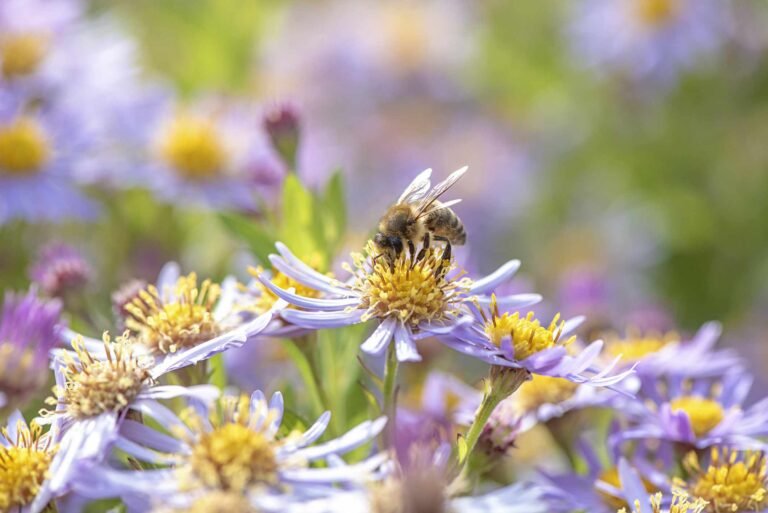:max_bytes(150000):strip_icc():format(jpeg)/GettyImages-1182690267-6d7834b20e8447b2bce1cf3238d48202.jpg)
Mosquitoes know how to ruin barbecues and days out. If mosquitoes are a problem in your backyard, you’ve probably researched or started spraying for them.
While you may only want to kill mosquitoes, spraying certain pesticides can harm more than just these biting pests. You may harm other insects that are important to the micro-ecosystems in your garden and beyond—even if you don’t mean to.
Here’s what you need to know about some mosquito sprays and some expert alternatives that keep mosquitoes away without harming bees, butterflies and other beneficial creatures.
Meet the expert
David Price is a certified entomologist and technical services manager at Mosquito Joe. He has over 26 years of experience in the industry.
Why is mosquito spray harmful to pollinators?
Mosquito Joe’s David Price says the mosquito spray contains neonicotinoids is the main culprit causing harm to other living species.
“Neonicotinoids can be toxic to pollinators, including honeybees,” he said. “They contribute to pollinator health by affecting their nervous systems.”
These pesticides are most commonly used in the United States and remain in the soil long after spraying, harming wildlife and insects. This is not ideal – disaster strikes when there are no pollinators around and it is best to find other solutions to repel mosquitoes.
Price suggests four other alternatives that are more effective and safer.
Alternative #1: Essential Oil Spray
The Spruce Tree / Nelly Cuanalo
Natural mosquito repellants made from essential oils like eucalyptus, lavender, citronella, and lemongrass are more effective and safer for pollinators, Price says. Plus, they’re easy to make yourself.
- Suggested price for you to choose the type of oil you want.
- Then, mix 10 to 20 drops of essential oil with 2 cups of water and a few drops of dish soap in a spray bottle.
- Each time you use this spray, shake it well and spray it evenly all over your backyard.
These contain scents that mosquitoes dislike and will stay away from. Most of these essential oils will also help repel other pests.
Alternative #2: Homemade Garlic Spray
While many of us love the smell (and taste) of garlic, it’s another smell that mosquitoes will try to avoid. This makes garlic a great ingredient for homemade sprays.
- Price says this is similar to creating an essential oil spray. You can mix crushed garlic with water (two cups of water).
- Pour this mixture into a spray bottle and spray it all over your yard.
- Price says for best control, reapply every 14 days.
Tips for pest control
Other pests don’t like this spray either. Slugs, bedbugs, and even deer are just a few of the pests that tend to stay away from areas sprayed with garlic-scented sprays.
Alternative #3: Professional, Eco-Friendly Treatment
Huntstock / Getty Images
If DIY pest control isn’t an option for you powerYou can call in the professionals. Note that pest control professionals and companies may be able to provide more environmentally friendly services or solutions that do not harm pollinators.
Options like these take the application equation out of your hands, are harmless to bees and butterflies, and are handled by trained technicians.
Alternative #4: Mosquito Repellent Plants
Another natural option that’s actually a boon to pollinators and other insects: mosquito-repelling plants. He notes that the concentrated oils from these mosquito-repelling plants form the basis of Price’s effective natural mosquito treatments.
Price has a short list of the top mosquito-repelling plants. They are:
- Citronella
- lavender
- Marigold
- Lemon grass
- rosemary
- Basil
- Garlic
- mint
- Perilla fruticosa
- catnip
Beyond just planting them, you can take it one step further to really amp up the scent. Price says to “crush up some leaves and leave them in that area” to repel mosquitoes in the other direction.
The best part is that bees, butterflies, hummingbirds and other beneficial garden visitors will love these plants and help pollinate them. You will have a lush garden and fewer annoying pests.
Other expert-approved ways to prevent mosquitoes
If mosquitoes continue to bother you, there are other defenses besides using sprays and traps.
- One of the most popular options is citronella candles. These can be placed around tables and chairs to avoid being bitten while relaxing.
- Outdoor fans are also useful for blowing away pests like mosquitoes. They even have the added benefit of keeping you cool with a pleasant breeze on the most humid days and nights.
